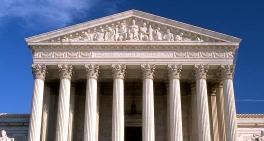Analysis: Outside groups may factor in Arkansas court race
Legal Business
Arkansas Supreme Court Justice Courtney Goodson lost her bid to run the state's highest court two years ago after coming under fire from conservative groups that spent big on mailers and TV ads targeting her. Two years earlier, David Sterling was defeated in the race for the Republican attorney general nomination despite outside groups going after his rival in that race.
Now, the two are about to face off in what could wind up being another costly and heated fight for a state high court seat that could overshadow other races on the ballot this year. It could also turn into a proxy fight over the state's resumption of executions and the court's role in scaling back what had been an unprecedented plan to put eight men to death over an 11-day period.
Goodson quietly launched her campaign last week, with an adviser confirming that she planned to seek another term on the state's high court in the May judicial election. The same day, Sterling said he planned to challenge the incumbent jurist.
Neither candidate has laid out campaign arguments, but the past two election cycles offer some guide of what to expect. Goodson launched her bid for the chief justice seat ago vowing to represent "conservative values" on the court.
"The Supreme Court is supposed to represent your common sense, conservative values, to uphold the rule of law and to look out for your rights," Goodson said in a campaign video she posted in the fall of 2015.
A year earlier, Sterling was touting his conservative credentials in his campaign for attorney general and promised to use the office to protect Arkansans from "an overreaching federal government." Sterling lost in the runoff for the Republican nomination against Leslie Rutledge, who is now seeking re-election as the state's top attorney.
Related listings
-
UN court: Nicaragua must pay Costa Rica environmental costs
Legal Business 02/03/2018The International Court of Justice has ordered Nicaragua to compensate Costa Rica for damage Nicaragua caused with unlawful construction work near the mouth of the San Juan River, in the court's first foray into assessing costs for environmental dama...
-
Supreme Court rejects case over Mississippi Confederate emblem
Legal Business 11/28/2017The Supreme Court on Monday rejected hearing a case that challenges the use of Confederate imagery in the Mississippi state flag.Carlos Moore, an African-American attorney from Mississippi, argued that the flag represents "an official endorsement of ...
-
Court case exposes rift in Germany's secretive Aldi family
Legal Business 11/24/2017A court deferred ruling Thursday in a case that has exposed a rift within Germany's secretive Albrecht family, owners of the discount supermarket chain Aldi.The dispute centers on the control over Aldi Nord, which operates in northern Germany and at ...

Can my trucking injury case be filed in Illinois?
If you have been injured in a truck driving accident, you may be wondering whether your worker’s comp case can be filed in Illinois. For an injured truck driver, this is an important question to ask, as the jurisdiction of the case can end up having a big impact on your benefits.
There are three main scenarios in which the Illinois Worker’s Compensation Commission would have jurisdiction over a trucking injury:
-If the accident took place in Illinois, If the employer is principally located in Illinois, or If the contract for hire is in Illinois
This means that a truck driver whose home terminal is in Illinois can make a claim for workers comp benefits in Illinois even if they were injured while on the road in another State. It also means that truck drivers who get hurt while passing through Illinois can file a claim in Illinois, even if their employer is located in another state.
If you have been injured on the road, and you are unsure where and how to file your workers comp claim, call us at (312)-726-5567 to begin your consultation. We can advise you whether Illinois is the right state to file for you. We have handled well over 30,000 claims for injured workers throughout the state of Illinois.




